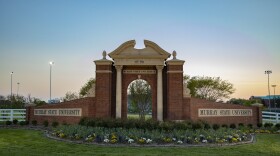Listen NowThe U.S. Secretary of Education, Arne Duncan has been making noise lately about charter schools — and he’s announced he wants to see more of them. Duncan’s enthusiasm is encouraging those in the charter school movement nationwide, but the appeal of these schools in this region is mixed. WFPL’s Elizabeth Kramer reports.US Education Secretary Arne Duncan spoke on Monday to the annual convention of the National Alliance for Public Charter Schools in Washington, D.C."I’m a big, big supporter of these successful public schools and so is the president. And that’s why one of our top priorities is a $52 million increase in charter school funding for our FY 2010 budget," Duncan said to applause from the audience.
Duncan's last job was the superintendent of Chicago Public Schools. His reform efforts aided the opening of most of the city’s 67 charter schools that studies show have performed well. These private schools get taxpayer money but are exempt from many rules regulating public schools.There are 4,600 charter schools across the country, but their achievements have been mixed. And there is only one in the Louisville are — just north of the Ohio River.At Community Montessori in New Albany, Indiana, students are out for the summer, but Glen Fondren is demonstrating a math lesson for visitors."This is a hundred square," he tells them. "So, there are 100 ones on here. There are 10 ten bars. So, which one’s bigger? A hundred or ten?"Fondren is the assistant director here. And he’s using small beads to show Gena and Jason Johnson Montessori methods for teaching students — like their five-year-old son, Aiden, whom they’re thinking of enrolling here. The Johnsons also are learning about charter schools, which the Indiana legislature authorized in 2001.Community Montessori’s director is Barbara Fondren; she’s married to Glen. Like Arne Duncan, she sees charters as a place for innovation"I think competition’s a good thing in education," Barbara Fondren says. "I think when different options increase for families — when we’ve had families move here from Kentucky — I think that helps all of our schools."She says six families moved to Indiana to attend this school. But she’s worried Indiana lawmakers will obstruct the charter school movement here."One of the things that we’re trying to address to the legislature now is — stop talking about a moratorium.Indiana Democrats have proposed halting charters for new schools. It’s part of the debate on the state budget now being drafted in Indianapolis. Critics supporting that move are citing last week’s study from a Stanford University research center that found students at charters didn’t perform any better than those at public schools.But there are really no heated debates about charters in Kentucky, which is one of 10 states with no charter schools.Jack Buckley teaches at New York University and co-wrote Charter Schools: Hope or Hype? He says charters are popular in urban districts with large failing schools serving significant impoverished populations. Charters become part of the landscape after free market economists, frustrated parents and education organizations band together to make them a reality.Buckley says beyond those districts, it’s another story."As you move away from major cities, urban districts that have problems over the years, you don’t usually find as much support," Buckley says. "And a lot of charter school initiative in suburban districts have failed."Even in Indiana’s most of the 50 charter schools are in Indianapolis and Gary, while the charter school movement has never taken hold in Kentucky. But people in Frankfort were listening to Arne Duncan’s speech this week, including Education Cabinet Secretary Helen Mountjoy. Ask her about charter schools, and she lists Kentucky’s efforts on education reform."We certainly feel that we have an alternative that is meeting many of the same things," Mountjoy says, "particularly in the areas of autonomy and being able to make decisions at the school level, in managing a budget, in hiring staff, in choosing instructional materials, and on and on."Those facets of the state’s education system grew after the 1990 Kentucky Education Reform Act, or KERA, was enacted to reduce economic disparity between schools.But it’s not clear if those and recent efforts to improve education will be enough to satisfy Arne Duncan to give any of the $5 billion in federal grants to Kentucky — even though Gov. Steve Beshear met with him earlier this month to extol Kentucky efforts.SOQ





